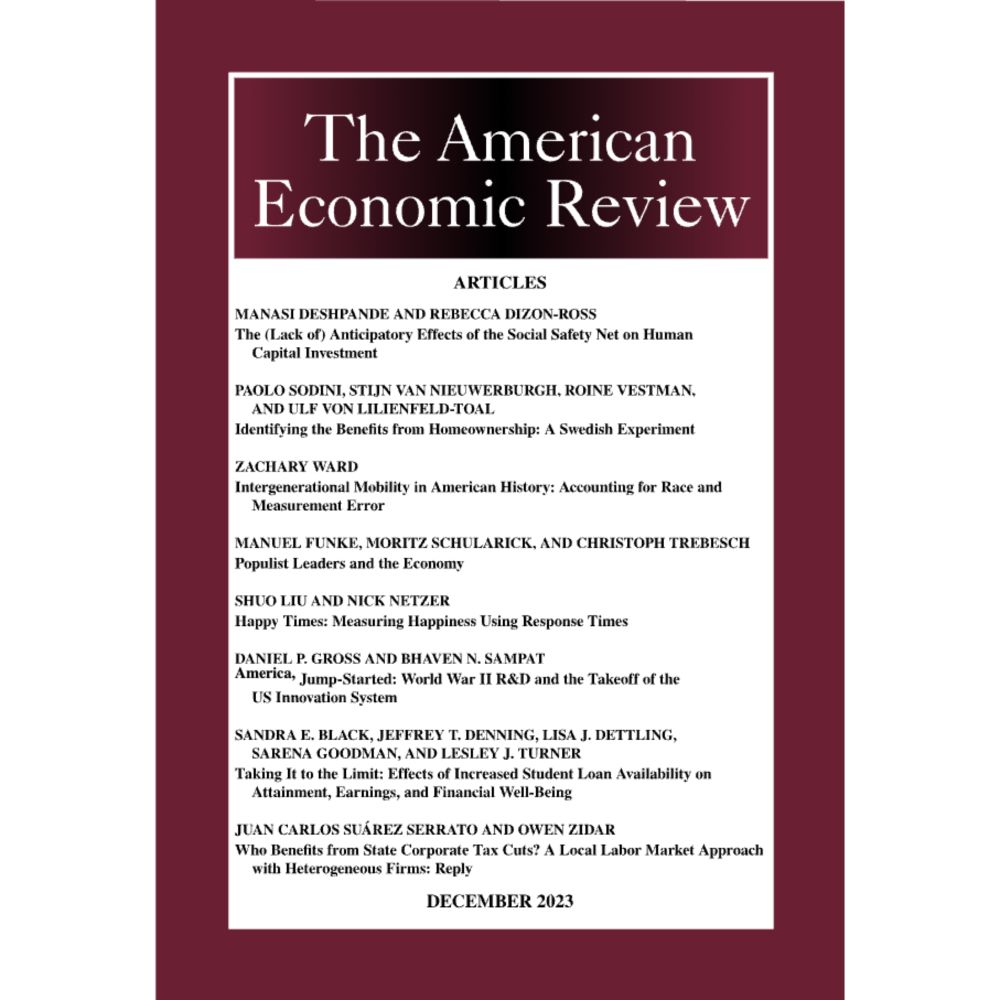
Cool new AER paper uses data from Clean Air Act offset markets to assess the efficiency of air pollution regulation. The analysis finds that marginal benefits of abatement exceed mean offset prices more than ten-fold, across most regions and pollutants.
18.09.2025 15:25 — 👍 9 🔁 4 💬 2 📌 1
Thanks!
28.08.2025 23:41 — 👍 2 🔁 0 💬 0 📌 0

Excited to see our paper in print! 'Is Air Pollution Regulation Too Lenient? Evidence from US Offset Markets.' www.aeaweb.org/articles?id=...
28.08.2025 13:45 — 👍 12 🔁 3 💬 0 📌 1

Stunning chart from a great paper by @joseph-s-shapiro.bsky.social: the IRA’s “leasing loophole” - which let foreign-made EVs qualify for tax credits - sent US leasing numbers soaring.
EU exporters were likely among the main winners - and will be among the first to feel the hit as the IRA unravels.
06.08.2025 09:04 — 👍 47 🔁 11 💬 1 📌 1
LSE Environment Week 2025 — LSE Environment Week
🚨 Call for papers:
Environment week at LSE will be Sept 22-25th.
Submissions are due soon (July 14)!
www.lse-environment-week.com/environment-...
09.07.2025 20:30 — 👍 12 🔁 8 💬 0 📌 0
Why it matters: 🌎⚖️
Designing optimal policies for externalities (smoking, innovation, pollution…) requires marginal costs and benefits, which are hard to estimate.
Offset markets help measure marginal policy costs, so can help design optimal policy.
7/7
27.06.2025 13:46 — 👍 2 🔁 0 💬 0 📌 0
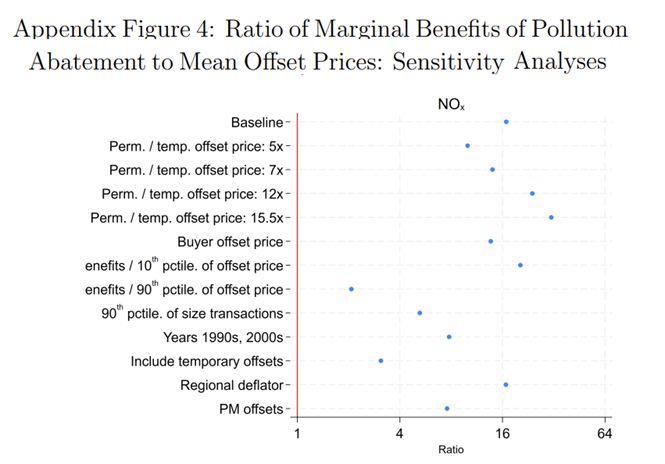
Robust findings: 🛠️📑
Other ways of aggregating offset price data give similar conclusions: marginal benefits of air pollution control ≫ marginal costs in most US regions
6/
27.06.2025 13:46 — 👍 1 🔁 0 💬 1 📌 0
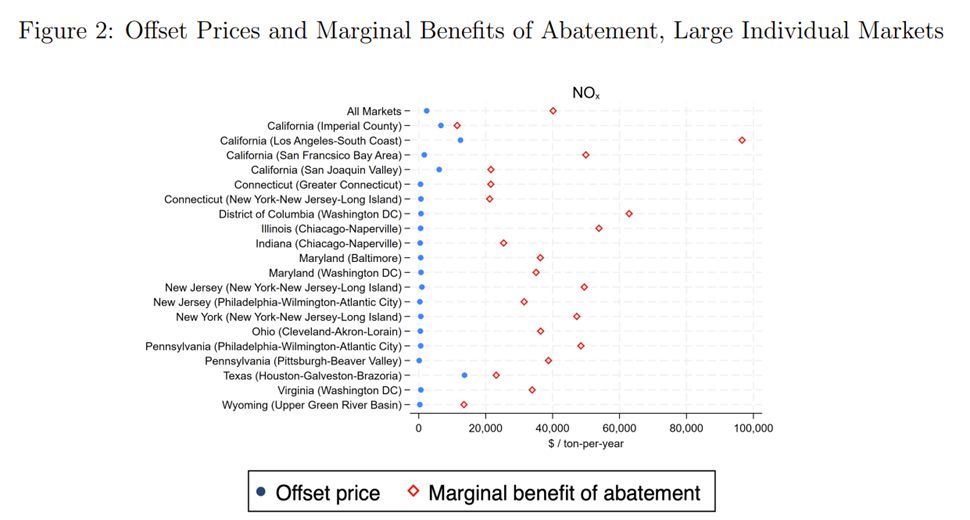
Striking result: 🚨
Average benefit of NOₓ control > $40,000/ton Average cost <= $4,000/ton
That’s 10× gap. VOCs yield similar findings.
Some markets are more lenient than others:
5/
27.06.2025 13:46 — 👍 1 🔁 0 💬 1 📌 0
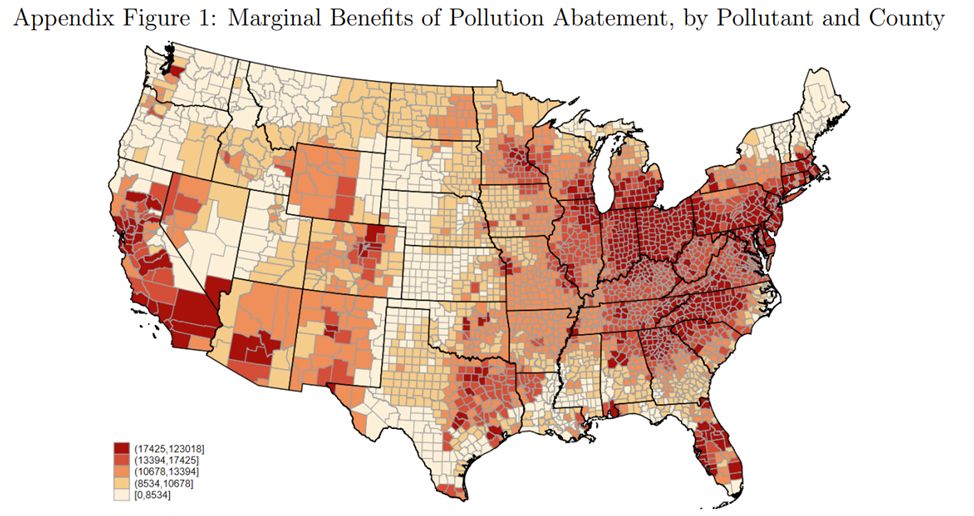
Then we compare: 📈📉
We compare control costs estimated from pollution offsets against model-based health benefits (AP2, AP3, InMAP, EASIUR) to estimate the net gains from reducing pollution.
One input from AP3 model: marginal benefits of cutting NOₓ by location 🗺️ 👇
4/
27.06.2025 13:46 — 👍 1 🔁 0 💬 1 📌 0
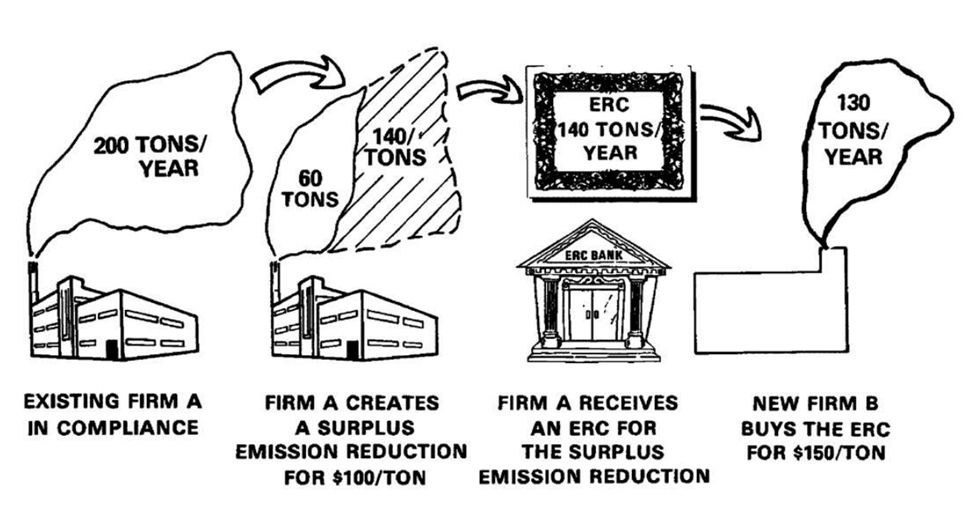
How offsets work:⚖️
New factories in polluted cities must “offset” emissions by paying existing plants in same region to reduce pollutant.
On margin, firms should equate offset prices to marginal cost of pollution control 💵
ERC = emissions reduction credit = offset
3/
27.06.2025 13:46 — 👍 1 🔁 0 💬 1 📌 0
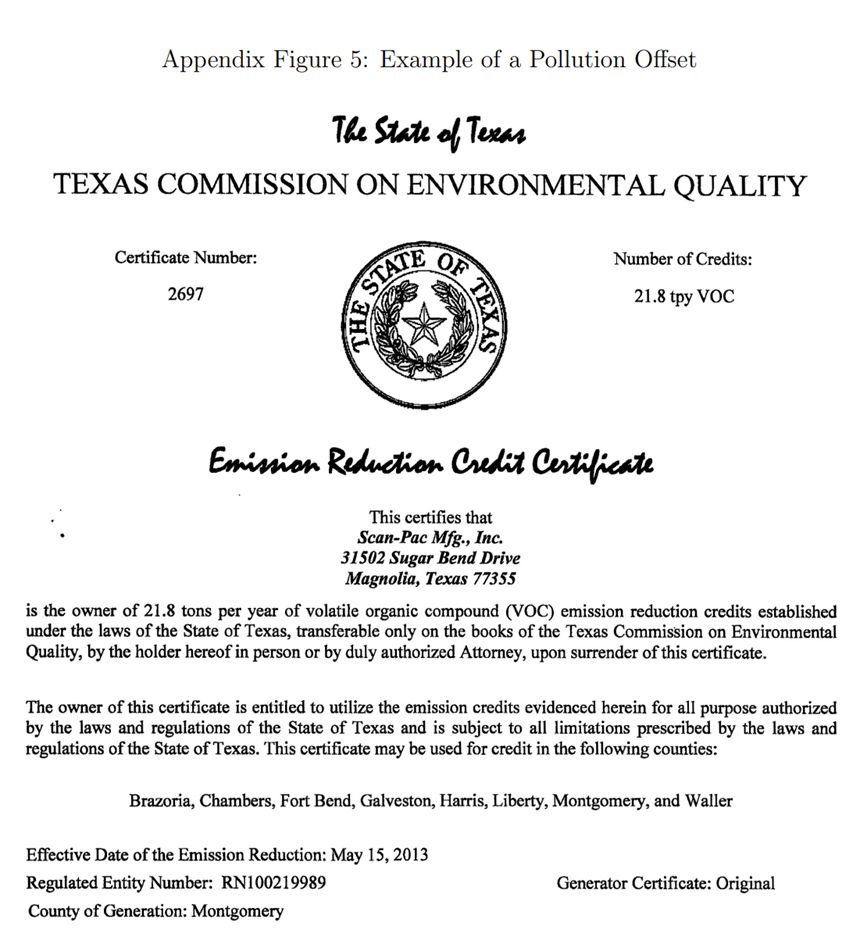
Approach: 🔍
We use prices from air pollution offset markets to estimate marginal costs of pollution control.
Each pollutant × region has own market.
100s of separate markets, distinct from cap-and-trade 🗺️📊
Example offset:
2/
27.06.2025 13:46 — 👍 0 🔁 0 💬 1 📌 0
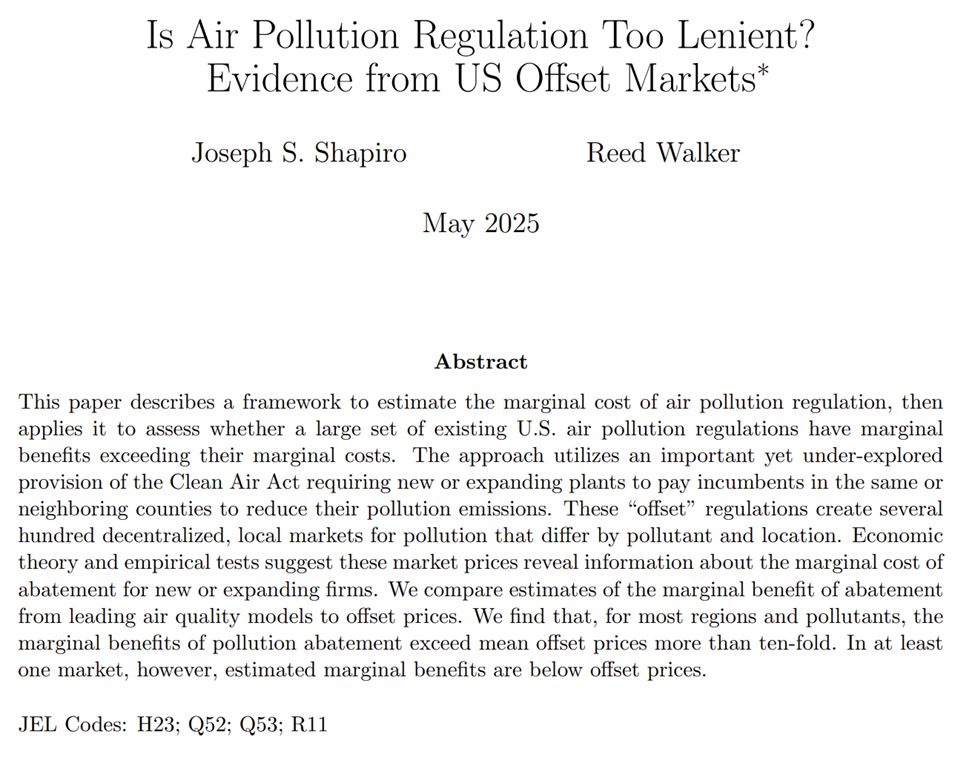
Is US air pollution regulation too lenient? 🏭💸
We find marginal benefits of pollution control exceed marginal costs by >10×.
New evidence from dozens of US pollution offset markets.
📄forthcoming at AER, w/ Reed Walker: joseph-s-shapiro.com/research/IsA...
1/🧵
27.06.2025 13:46 — 👍 22 🔁 9 💬 1 📌 2

Striking result: 🚨
Average benefit of NOₓ control > $40,000/ton
Average cost <= $4,000/ton
That’s 10× gap. VOCs yield similar findings.
Some markets are more lenient than others:
5/
27.06.2025 13:25 — 👍 0 🔁 0 💬 0 📌 0

Then we compare: 📈📉
We compare control costs estimated from pollution offsets against model-based health benefits (AP2, AP3, InMAP, EASIUR) to estimate the net gains from reducing pollution.
One input from AP3 model: marginal benefits of cutting NOₓ by location 🗺️ 👇
4/
27.06.2025 13:25 — 👍 0 🔁 0 💬 1 📌 0

How offsets work:⚖️
New factories in polluted cities must “offset” emissions by paying existing plants in same region to reduce pollutant.
On margin, firms should equate offset prices to marginal cost of pollution control 💵
ERC = emissions reduction credit = offset
3/
27.06.2025 13:25 — 👍 1 🔁 0 💬 1 📌 0

Approach: 🔍
We use prices from air pollution offset markets to estimate marginal costs of pollution control.
Each pollutant × region has own market. 100s of separate markets, distinct from cap-and-trade 🗺️📊
Example offset:
2/
27.06.2025 13:25 — 👍 0 🔁 0 💬 1 📌 0
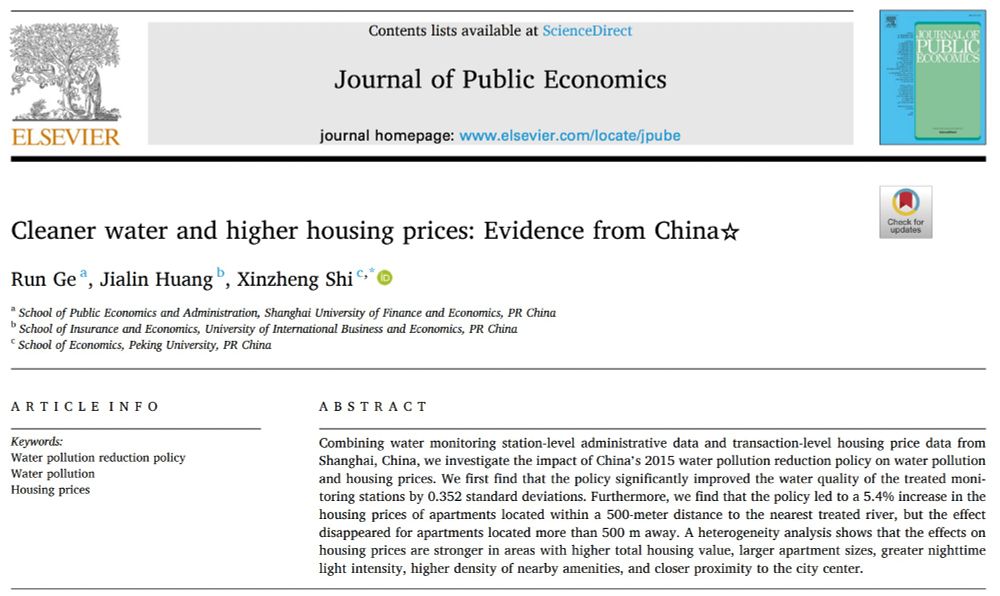
Just published in @jpube.bsky.social:
"Cleaner water and higher housing prices: Evidence from China"
By Run Ge, Jialin Huang, & Xinzheng Shi
www.sciencedirect.com/science/arti...
#econsky
24.05.2025 00:03 — 👍 13 🔁 5 💬 1 📌 0
summer school — Maximilian Auffhammer
🌎 PhD students: apply to 2025 Berkeley/Sloan Summer School in Environmental/Energy Economics!
🔗 Info + application: www.auffhammer.com/summer-school
📅 Deadline: May 14 | Program: Aug 18–22 at Berkeley
w @auffhammer.bsky.social @severinborenstein.bsky.social, TCarleton, MFowlie, KJack...
25.04.2025 22:35 — 👍 20 🔁 13 💬 0 📌 2
Globalization and the Environment - ONLINE ONLY
Globalization and the Environment - ONLINE ONLY ESA - Central Council
🌍 Free 1hr webinar today: Globalization & The Environment
📅 Apr 2, 6pm PT US | Apr 3, noon Australia
🔗https://esacentral.org.au/event/58402/globalization-and-the-environment-online-only
- How globalization affects the enviro
- How enviro policy reshapes trade
Host: Economic Society of Australia
02.04.2025 17:10 — 👍 2 🔁 1 💬 0 📌 0
Looking forward to this, especially the lunchtime panel I get to do with @kylemeng.com and @chadbown.bsky.social!
17.03.2025 03:24 — 👍 9 🔁 2 💬 0 📌 1

Energy Markets, Decarbonization, and Trade, Spring 2025
🚨Incredible lineup at @nber.org conference this Thurs/Fri 3/20-21: **Energy Markets, Decarbonization, and Trade**
📑Agenda www.nber.org/conferences/...
🎥 Webstream www.youtube.com/nbervideos
Organized w Natalia Ramondo, supported by @sloanfoundation.bsky.social
17.03.2025 03:16 — 👍 12 🔁 8 💬 0 📌 4
Great! Hope you/students find it useful. Slides are online in case they are helpful joseph-s-shapiro.com/research/SEE...
28.01.2025 04:45 — 👍 1 🔁 0 💬 1 📌 0
I think of spatial autocorrelation as a general issue, not specific to environment. Re:publication outlets, this is always a relevant question but we are squeezed for space and I find it challenging to give general advice on this kind of question without knowing the specific context.
28.01.2025 04:44 — 👍 1 🔁 0 💬 0 📌 0
Thanks Ariel! Re:unobservables/uncertainty, what did you have in mind? We talk about some spatial research designs and place-based environmental policies. As to spatial inference, we try to focus on spatial issues particular to the environment or environmental issues specific to spatial settings...
28.01.2025 04:44 — 👍 0 🔁 0 💬 1 📌 0
spatial-environmental literature looks more at intra-national issues.
Long answer to a good question!
26.01.2025 23:02 — 👍 1 🔁 0 💬 1 📌 0
5. Another comparison the paper makes is that 'Trade and the Environment' has been its own area for awhile (with its own books, JEL code, sections of graduate syllabi, conferences and sessions, etc.). Most of that work looks at international but not intra-national issues, and the emerging...
26.01.2025 23:02 — 👍 1 🔁 0 💬 1 📌 0
spatial/regional/urban/trade and in environmental/energy/resources, 'to what extent do you think this is its own subfield?' Many answers were different forms of, 'it is beginning to be a subfield, with conferences, conference sessions, a growing number of people writing many papers in it, etc.' ...
26.01.2025 23:02 — 👍 0 🔁 0 💬 1 📌 0
3. Our discussant on this chapter at a recent conference, Scott Taylor, pointed out that one challenge in writing this chapter is Spatial Environmental Economics doesn't really exist as its own subfield; our sense is that critical mass is starting to form. 4. We asked several folks in both ...
26.01.2025 23:02 — 👍 0 🔁 0 💬 1 📌 0
spatial environmental topics, and there are important exceptions. 2. Critical mass is needed to move beyond individual scholars and papers to being a field (/subfield), our sense: this is gradually forming and this chapter describes a snapshot of that process.
26.01.2025 23:02 — 👍 0 🔁 0 💬 1 📌 0
Professor of Environmental Engineering + Environmental Health Sciences, UC Berkeley.
Research: air pollution, health, climate, EJ.
Economic historian of U.S. cities. Interested in segregation, land use regulation, and affordability over the long run. Views expressed here are my own. Personal website at allisonshertzer.com.
Chaired Professor at Paris School of Economics, Director of the Institute for Macroeconomic and International Policies (i-MIP)
Personal page : http://www.lionel-fontagne.eu/
Economics Professor at Imperial College London
Economist at Boston College | https://www.faridfarrokhi.com
Assistant Professor of Economics
Tufts University
https://jingli-econ.github.io/
Behavioral economists at UC Berkeley
Professor, UC Berkeley | Climate Fellow, Harvard Business School
climate and clean energy policy | www.jonasmeckling.com
Economist, Economic Historian. Soccer Dad, Climber Dad.
https://voices.uchicago.edu/richardhornbeck/
Chief Economist & Director of Analysis at FCDO, Professor of Economics at University of Warwick, CEP/LSE, CEPR.
Kleinheinz Family Professor of International Studies and Professor of Economics, Department of Economics, Stanford University
Owens Distinguished Professor of International Economics at NC State University. Senior fellow at the Peterson Institute for International Economics.
Environmental economist, Professor @Cornell Brooks Public Policy, Fellow @Cornell Atkinson Center for Sustainability, President @aereorg.bsky.social. Views are my own.
https://sites.google.com/view/sheilaolmstead/
Assistant Professor @Northwestern University working on macro, climate&energy, inequality and monetary policy
diegokaenzig.com
Economist interested in urban transportation in developing countries.
Economics Department, Harvard University
https://sites.google.com/site/gabrielkreindler
Macro-Development Economist. Associate Prof (untenured) @Columbia_Biz @Yale PhD. FRF @NBER. Research Affiliate @CEPR and @BREAD
Associate Professor in Business and Public Policy at @BerkeleyHaas | Political Economy, Econ History, Organizations
www.guoxu.org
Assistant professor @UCBerkeley ARE: international trade and applied econometrics.









